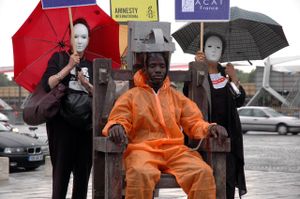What it means to believe in consistent life ethic.
I’m Isaac Saul, and this is Tangle: an independent, ad-free, subscriber-supported politics newsletter that summarizes the best arguments from across the political spectrum on the news of the day — then “my take.” First time reading? Sign up here.
A few months ago, I interviewed one of the men who helped draft Texas's abortion law, which essentially bans any abortions after six weeks of pregnancy.
In response to the interview, I heard from many on the left who asked some form of this question: “How can people who are pro-life also support the death penalty?” In the ensuing weeks, I was left covering the history of abortion and then explaining my own pro-choice position in the pages of Tangle.
Somewhere along the line, a reader named Sophie Trist reached out to me. She had a fascinating argument to go with an amazing personal story that she was hoping to share in this newsletter: The consistent life ethic, an idea that merges prominent beliefs on the left and right into a pro-life, anti-death penalty, disability-conscious, progressively liberal worldview. I've read about the consistent life ethic before, and I have many “pro-life Democrats” as readers who have reached out to me, but I found Sophie's piece — especially her personal story and how it relates to her worldview — particularly interesting.
So, after running some edits back and forth, I've decided to publish it here, in full. While Sophie and I may not see eye to eye on some of the issues in this piece, I'd like to thank her for taking the time to share her story and for her beautiful writing. I think she’s someone we’ll be hearing from again in the future. If you'd like to reply, feel free to write in, Sophie will receive your comments (I'll give her opportunities to respond, too). Her bio is at the bottom of this page.
On a bright May morning in 2017, my best friend and I made the hour-long drive from New Orleans to the state capital building in Baton Rouge to testify in support of a bill that would abolish the death penalty in Louisiana. We were eighteen and just discovering our passion for social justice. My friend and I spent days carefully researching the history of executions and exonerations in our state and crafting appeals to our legislators' professed pro-life values. Unfortunately, the bill to abolish the death penalty failed, and has failed several times since despite garnering bipartisan support.
My friend and I felt that the senators didn't take our testimonies seriously because of our youth and, in my case, the fact that I'm totally blind. But that was far from our last foray into social justice activism. Together, the two of us have raised over $20,000 for a local shelter for homeless youth, including young parents and their children, and worked with organizations helping to support and empower human trafficking survivors and immigrants at the U.S.-Mexico border.
You probably think I’m your typical millennial social justice warrior who fits neatly into the political box labeled "liberal" or "progressive." But there's a catch: I also believe that abortion is not healthcare, but the violent death of a human being. I do not believe abortions should be permitted unless the pregnant person’s life is in danger. I call myself a pro-life Democrat, but I'm essentially politically homeless; I'm registered as an independent and don't think that will change anytime soon, unless the Democrats step back from abortion extremism and reopen their big tent to the millions of pro-life Americans. Or, alternatively, Republicans start demonstrating that they care for marginalized lives outside of the womb.

